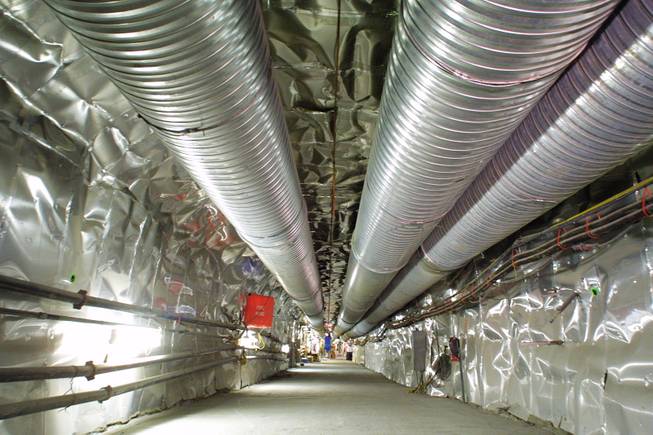
Las Vegas Sun
This is a tunnel seen during a public open house of Yucca Mountain on Saturday, Nov. 3, 2001.
Wednesday, March 25, 2015 | 9:37 a.m.
In the wake of a controversial opinion piece by Nevada's newest member of Congress calling for a conversation on Yucca Mountain, it may seem as if the zombie project has risen from the dead.
But the op-ed really has all sides digging in their heels.
Rep. Cresent Hardy, a Republican whose district covers Yucca Mountain sits, wrote in the Las Vegas Review-Journal on Sunday that "we should at least be up for an honest conversation" about the project's plausibility and what it could bring to Nevada.
"I just thought it was fair that people should know where I stand on issues," he said in an interview Tuesday.
Nevada's Democratic leaders and ardent Yucca opponents responded predictably. Sen. Harry Reid and Rep. Dina Titus, of Las Vegas, blasted Hardy's call for dialogue on storing the nation's nuclear waste 90 miles northwest of Las Vegas irresponsible. Republican leaders in the state like Sen. Dean Heller and Gov. Brian Sandoval also oppose the project.
What Hardy wrote Sunday is consistent with what he's said since he was elected in November to represent North las Vegas and central, rural Nevada.
He said Tuesday that the fuss over his article was indicative of his larger concern that lawmakers had become too fearful of having open and honest discussions.
"This is the problem with Washington," he said. "People don't want to talk about the issues, they want to avoid things."
Hardy's views also have aligned with those of Rep. Mark Amodei, a Northern Nevada Republican, who told the Mesquite News in February that state leaders shouldn't just scream "no" on Yucca.
The only slightly updated response to Hardy's op-ed came from Rep. Joe Heck, a Republican representing the Las Vegas suburbs. Heck signed on to legislation preventing the project from being forced on Nevadans. But he agreed with Hardy that Nevadans should let Yucca Mountain's evaluation process run its course so the state could weigh all the facts and decide whether it wants the project.
"Nevada deserves a seat at the table on Yucca Mountain," Heck said in a statement.
A broader discussion on nuclear waste
The debate between Nevada's congressional lawmakers is happening as Washington ramps up its annual debate over what to do with the nation's highly radioactive nuclear waste, tens of thousands of tons of which is sitting at reactors across the country.
A bipartisan group of senators from such states as California and Alaska reintroduced a bill Tuesday calling for an independent commission to find temporary and permanent storage.
The legislation was also introduced last Congress and largely follows a Blue Ribbon Commission report put together in 2010 by President Barack Obama. Neither the report nor the legislation mention Yucca Mountain as a potential storage site, and both call for the host states to support the project.
"The United States desperately needs a comprehensive nuclear waste policy," Sen. Dianne Feinstein, D-Calif., said in a statement. "We simply cannot allow spent nuclear fuel to remain indefinitely at sites scattered throughout the country, stored at taxpayer expense, awaiting a clear path forward."
There's a push to restart the path to Yucca Mountain in the House of Representatives, where Rep. John Shimkus, an Illinois Republican, plans to introduce legislation this year continuing the project. He's also leading members of Congress on a tour of the site in April, which Hardy and Amodei are attending.
But alternatives to Yucca are forming as well. A Dallas-based company announced in February it would seek a license from the governing Nuclear Regulatory Commission to store thousands of metric tons of nuclear waste in West Texas.
Also on Tuesday, the Obama administration announced it would develop a separate nuclear waste storage site for defense waste.
Yucca Mountain is officially still the nation's site to store commercial nuclear waste. Congress approved it in 1987, but Obama stalled the project in 2009 at the behest of Reid, then the Senate majority leader.
During every Congressional session since, Yucca supporters have unsuccessfully tried to fund the project, but Reid has stripped the money out. No longer the Senate majority leader, Reid still has tricks to keep Congress from spurring the project forward.
But a strike against Reid came earlier this year, when the Nuclear Regulatory Commission finished a five-volume safety report that determined the waste would be safe for a million years buried in the Nevada desert. But Reid and opponents point to a section of the study that says the government would need to get water and land rights to start the project, which won't happen while Nevada's senior senator is in Congress.
Meanwhile, Hardy says he'll only support the project if it's determined safe.
Asked how it could be determined that the project was safe after $15 billion dollars of evaluations and studies over 30 years, Hardy said he didn't know — and that was the problem.
"That's what you need to look at," he said. "You need to see what's there and get right down to it where people really discuss the evaluations."

Join the Discussion:
Check this out for a full explanation of our conversion to the LiveFyre commenting system and instructions on how to sign up for an account.
Full comments policy